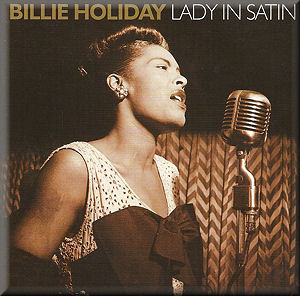CD1 -
Lady in Satin
1. I'm a Fool to Want You
2. For Heaven's Sake
3. You Don't Know What Love Is
4. I Get Along Without You Very Well
5. For All We Know
6. Violets for Your Furs
7. You've Changed
8. It's Easy to Remember
9. But Beautiful
10. Glad to Be Unhappy
11. I'll Be Around
12. The End of a Love Affair
Billie Holiday - Vocals
Ray Ellis - Arranger, conductor
George Ockner - Violin
David Sawyer - Cello
Janet Putnam - Harp
Danny Bank, Phil Bodner, Romeo Penque - Flutes
Mel Davis - Trumpet
J. J. Johnson, Urbie Green, Tom Mitchell - Trombones
Mal Waldron - Piano
Barry Galbraith - Guitar
Milt Hinton - Mass
Osie Johnson - Drums
Elise Bretton, Miriam Workman - Backing vocals
CD2 -
Last Recording
1. All of You
2. Sometimes I'm Happy
3. You Took Advantage of Me
4. When It's Sleepy Time Down South
5. There'll Be Some Changes Made
6. 'Deed I Do
7. Don't Worry 'bout Me
8. All the Way
9. Just One More Chance
10. It's Not for Me to Say
11. I'll Never Smile Again
12. Baby, Won't You Please Come Home
Billie Holiday - Vocals
Ray Ellis - Arranger, conductor
Romeo Penque - Alto sax, tenor sax, bass clarinet
Gene Quill - Alto sax
Al Cohn - Tenor sax
Danny Bank - Baritone sax
Harry Edison, Joe Wilder - Trumpets
Jimmy Cleveland, Billy Byers - Trombones
Janey Putnam - Harp
Hank Jones - Piano
Kenny Burrell, Barry Galbraith - Guitars
Joe Benjamin, Milt Hinton - Bass
Osie Johnson - Drums
Poignancy is built into these two LPs, now released together on a budget-price double CD. They are the last two albums recorded by Billie Holiday - in 1958 and 1959 respectively. The latter album was originally entitled Billie Holiday and was released shortly after she died. On both albums, Billie's voice sometimes has the quavery quality one might except from an ageing woman, but Holiday's voice had always been slightly tremulous and her range was limited - yet here she could still reach the top and bottom of that range when she decided to. She never lost her ability to phrase songs with a jazz inflection. And the tremble in her voice could accentuate the sadness in some of the lyrics.
The first LP accompanied Billie with a lush string orchestra (arranged by Ray Ellis) which was often in danger of swamping her voice. Nonetheless, Billie as usual managed to convey the depth in the songs. Some of them - like I'm a Fool to Want You and You've Changed - seem almost autobiographical. This may be what led The Penguin Guide to Jazz on CD to call the album "A voyeuristic look at a beaten woman". I think this is a misguided assessment, as Billie Holiday always had an impregnable dignity which meant that she could never be called "beaten". In fact the message in her singing is that humans can triumph over all kinds of troubles.
The Last Recording album reduced the amount of string accompaniment, making for a jazzier session, exemplified by the opening All of You with muted trumpet accentuations (from Harry Edison?), a nice tenor sax solo - and no strings. 'Deed I Do is also lifted by having no stings but a jazzy riff from the horns as the main backing. When It's Sleepy Time Down South starts with the seldom-heard verse, where Billie is backed simply by guitar. There'll Be Some Changes Made fades out towards the end with an incomplete tenor solo, suggesting an unsuccessful take. But Holiday even tackles a new song like All the Way, which had been a hit for Frank Sinatra two years earlier.
Billie's resilience is evident throughout this album. As she sings with total sincerity: Don't Worry 'bout Me.
Tony Augarde
www.augardebooks.co.uk
